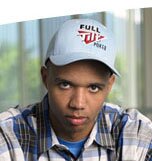Jay Greenspan
February 13, 2006
As a writer covering the poker circuit, I wasn't surprised to see that John D'Agostino took second in the Borgata Winter Open, netting more than half a million dollars. John is widely considered one of the great, young, all-around players in the game. He's equally comfortable playing limit and no-limit, cash games, and tournaments.
I got a particularly close look at John's play a week prior to Borgata, when we shared a table in Tunica at the $10,000 buy-in World Poker Tour event. John didn't cash in that event, but during the hours we played together, I witnessed many qualities that make him a great player - here are three of them.
Overcoming a Tough Stretch
In Tunica, the players started with 20,000 chips. Within the first blind level, almost half of John's stack was gone. In a key hand, John made a tough lay down when he deduced that his high pocket pair hand had not survived to the river. A couple of difficult hands followed soon after.
It was the kind of tournament start that dispirits others. After such a difficult opening, it's not uncommon to see even very good players overwhelmed with resignation. I've heard players utter "It's not my day." At that point, they're sealing their fate.
John, however, settled in. He didn't make unneeded moves that would decimate his stack. On his way to his second-place finish at Borgata, John was able to deal with a far greater level of adversity. With 25 players remaining, John was the chip leader, holding nearly one million in chips. A few tough hands and four hours later, John held only 280,000 chips and was in twelfth place with 16 players remaining.
Despite these setbacks, he didn't tilt - he focused and made good decisions. He waited for his spots and was able to build his stack back.
During Tunica, John was keenly aware of his own stack and the stacks of others. After the tough early hands, he was quiet while waiting for a spot to double up. He didn't rush it. He knew that he held more than 20 big blinds in his stack and could wait for the right opportunity. He wasn't forced to push in on Ace-Nine or a pair of 3s.
Once he managed to build himself back, he was on the hunt, looking for stacks to attack. Sadly for me, he noticed that I had become the table short stack. John was in late position when I had the big blind, and he let no opportunity go by to attack my blind. With only 20 big blinds, I couldn't afford to fight back without a premium hand, as any decision I'd make would be for my tournament life. John was the only one at the table (other than me) who seemed fully aware of the situation. Others were far more focused on their own cards, rather than on the other factors that would give them opportunities to pick up pots.
Inscrutable Behaviors
In Tunica, most of the players at my table offered a treasure trove of information. They varied their bet sizes pre-flop - a little higher when they didn't want action, a little lower when they welcomed it. Their arm and hand movements varied wildly from hand to hand. With time, one could draw fairly accurate conclusions based on such tells.
John, however, offered nothing. When he open-raised, he did so for three times the big blind every time. His motions seemed nearly identical to me time after time. If I tried to read his facial expression, I got only a view of his downcast eyes as he stared vacantly at the felt. As far as I could tell, there was nothing to learn.
The Tunica event didn't go well for me, but I leaned a lot from watching John. Without question, observing the pros is one the easiest ways to improve one's game.
Jay Greenspan
|



